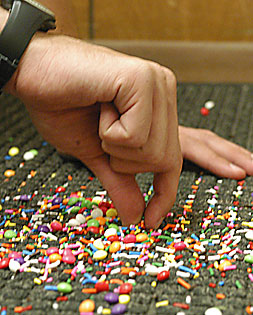 |
|
Photo Illustration by Chrystal McConnell/Arizona Daily Wildcat
|
Greek life officials are cracking down on hazing incidents at fraternities. The Kappa Sigma fraternity forced pledges to pick up sprinkles, and sort them by color, an activity that took the pledges all night to complete, and that contributed to Kappa Sigma's loss of university recognition.
|
|
|
By Cara O'Connor
Arizona Daily Wildcat
Wednesday September 24, 2003
The "Animal House" image of fraternity life, where togas, kegs and paddling incidents make up the standard Friday night, has long been the perception of greek life in popular culture.
Although "Animal House" came out more than 25 years ago, the perception is embedded in the minds of Americans, and it's one that university officials are aggressively trying to change through education.
Educating students about hazing is the key to stopping it, said Beth Conder, greek life coordinator.
"I don't think our students are educated enough about what hazing is, why it shouldn't be happening and the consequences of it," she said.
As part of the Faculty Fellows Series, the Dean of Students office will host an open discussion on hazing at noon today in the Gallagher Theater. This forum is an important step in educating students about hazing in an effort to prevent it, said Carol Thompson, senior associate dean of students.
UA greek life officials have been working to inform the community about hazing with pledge education programs, open discussions with chapter leaders and, most recently, the development of the Greek Life Task Force.
The task force will not only investigate and address hazing, but it will also address scholarship, risk management, rush and recruitment and membership development.
"I think what the greek life office is doing now with all the training on hazing and all the discussion is a good way to do it," said Jamie MacGeorge, president of Delta Tau Delta, a fraternity that was placed on probation for hazing violations last spring.
Fraternities and sororities are looking at their pledge education programs to make sure they do not include hazing, he said.
"We added on the responsibility of making sure that no hazing happens," MacGeorge said.
Hazing is a thorny problem for the university to overcome because it's a centuries-old tradition, Thompson said.
"It has been embedded in societies for hundreds of thousands of years," she said.
She said that tradition is what keeps students hazing, despite new laws and school policies.
"Intellectually they know it's wrong," she said. "They don't want to be the one to break the tradition."
But MacGeorge said that that attitude is changing among students.
The students who join greek organizations today are not the same types of people that joined them 20 years ago.
"Now people are not going to take it," he said. "I think it has come to the point where everyone understands that hazing is a negative thing."
That attitude change comes on the heels of a crackdown on hazing in the past year and a half, which led the Dean of Students office to revoke the recognition of or put on probation at least five fraternities as well as one organization in the honorary system.
Thompson said that she is not only concerned about hazing in the greek system, but also in honoraries and athletics.
Chain Gang, an honorary for juniors, has been sanctioned with hazing and alcohol violations this year and was placed on probation until May.
The group's sanctions include mandatory group discussions about the consequences of hazing.
"They are going to be a better, stronger organization as a result of the changes they make," ASUA advisor Jim Drnek said.
Teaching educators to recognize hazing and to understand state laws is equally as important as teaching university students, since most hazing starts before students reach college, Drnek said.
"They are learning it really early. They are learning it before they ever get here," he said.
Hazing cases have been reported in high schools all around the country.
At Glenbrook North High School near Chicago, five girls were hospitalized following an incident where senior girls were videotaped pummeling junior girls and showering them with human feces, paint and garbage in a muddy field at a powder-puff football game in May.
Cases like this have prompted most states to pass anti-hazing laws in the last decade.
Arizona passed anti-hazing legislation in 2001, prohibiting hazing at all schools in the state. The law defines hazing as an intentional act committed by a student against another student in connection with initiation or membership in an organization that could cause physical harm, mental harm or degradation.
Hazing has traditionally been viewed as a rite of passage, something that everyone has to go through that creates a common bond between members, Thompson said.
The rite of passage mentality can be explained by the concept of evolutionary psychology, the idea that the human psyche has evolved over millions of years the same way that our bodies have, said Keith Henson, an evolutionary psychology researcher and UA alumnus.
"The problem of it is that hazing is just part of human psychology," he said. "It's a million-year-old piece of human evolution."
Henson said that hazing serves as a way for a new member to show his allegiance to a group.
"Semi-ritualized abuse has an actual function, kind of like basic training in the military," he said, adding that basic training forms such a strong bond between people that they would sacrifice their lives for one another.
MacGeorge said that physical forms of hazing like calisthenics are designed to make the people doing the activities bond with one another.
"They work them until they start working together," he said.
He said that hazing was a way for active members to assert their authority over new members.
"It was a way that actives made sure that pledges knew what was going on, that they stayed in line," he said.
